Melissa Chan wrote in an article for Time magazine last week, “a surge in pandemic pet adoptions offers opportunities for criminals to seize on nationwide demand and shelter shortages…”
People are so desperate for French bulldogs, one small private investigator in Nebraska who specializes in missing pets says calls have increased 60-70% in the past 18 months, averaging 3-5 requests a week.
Reading the article, I could only shake my head. It seemed to me Chan was writing about another world altogether. It wasn’t the news that so many pets are being stolen—that is individually tragic—but it was how she so breezily tossed off the phrase, shelter shortages, as if it were fact.
It’s not.
There are still plenty of dogs who continue to sit in shelters for months or years or are euthanized. Mia, one of the most loving fosters I’ve had has been in rescue over a year now.
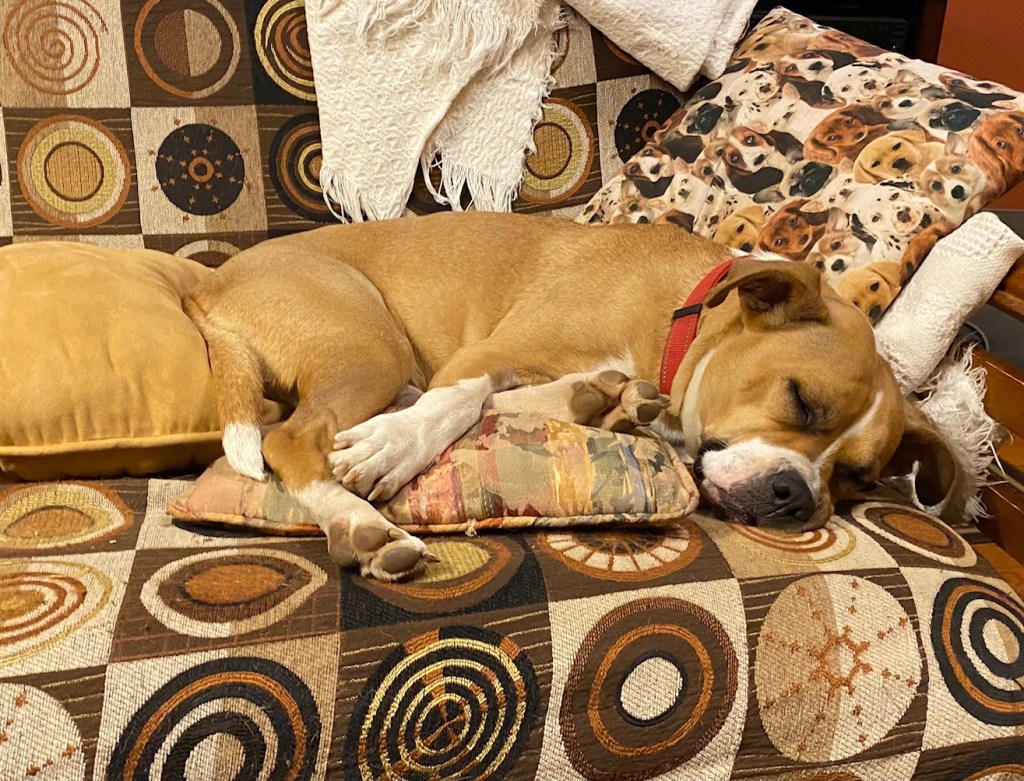
In rescue, you often hear people refer to the problem in the south as an ‘overpopulation problem‘. But that’s simply not true either. There are not too many dogs in this country. There are simply too many unwanted dogs. There are plenty of homes. In fact, if every person so desperate they will pay for a stolen dog, instead adopted a shelter dog, we’d be closing shelters all over.
The Humane Society’s latest numbers (2019-2020) reported that 44% of people got their dog from a rescue or shelter – which is great news. (although that was the same percentage as 2017-2018) About 30% bought their dog from a breeder or pet store. The rest found them as strays, received them as gifts, bred them at home, or got them from a friend or neighbor.
The country has somewhere around 90 million dogs and there are about 6 million dogs entering shelters each year. Of those, about 1 million are being euthanized. (Here I have to note that of the 50 shelters, rescues and dog pounds I have visited, I would bet maybe half of them report any numbers anywhere, so I’m gonna guess that those numbers are on the low side.)
Do a little math, and it’s clear that if just a third or less of those people who are planning to buy a dog, instead adopted a dog, no dogs would have to die. None. This fact just levels me every time I think about it. It’s so easy. Such an easy fix.
As I read the Time article, though, I kept coming back to the words ‘shelter shortages.’
Every Friday, Amber of Halfway Home Animal Rescue (featured in the documentary you’ve been hearing so much about) drives to the pounds in western Tennessee to pull dogs that would otherwise be euthanized for space in those crowded shelters. I don’t think Amber, or many people in rescue have seen these mythical shelter shortages.
Inevitably, she can’t take every dog in danger and she can’t get to every pound or shelter.
There are no shelter shortages or overpopulation problems—there is just a problem of marketing and geography. There are enough dogs for everyone in this country, if everyone could just get past breed labels and breed prejudice and open their hearts to a dog—a good dog.
I know lots of good dogs. In fact, I have an incredible dog in my kitchen, still patiently waiting for her forever home a year after all her puppies were adopted.
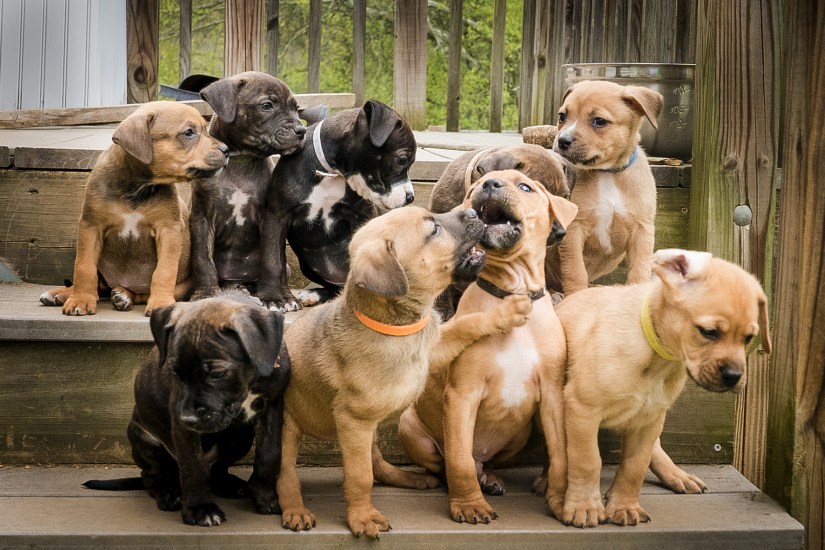
Mia languishes here for a lot of reasons, but the largest one is that she is so clearly a ‘pit bull’ type dog. Yes, she has outsized energy that has to be managed. But it’s really not that hard to do.
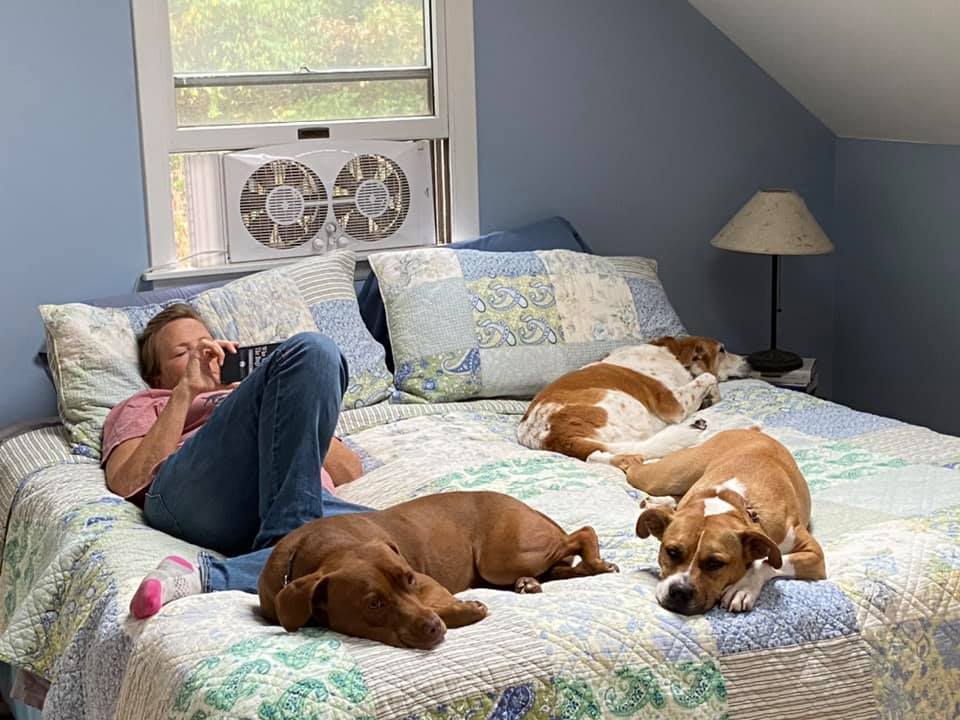
Yes, she has bite addendums, but I would assert that they are undeserved. I have yet to see her bite, growl, or even threaten a single person in her year with us. Here she is with my 86-year-old parents who visited for the second time in a year on Easter Sunday:
And here is Mia, tolerating Fanny Wiggles who wants her to get up and play:
Are you as amazed as me that this sweetheart of a pup is still in foster care over a year later?
If Mia had been snapped up amidst the shelter shortages, we would have been able to save a dozen other dogs by now. Instead, we spend our days saving just this one. Lucky for us, she’s a wonderful guest and well worth saving.
Thanks for reading!
Cara
For information on me, my writing, and books, visit CaraWrites.com where you can also find more information on my book, One Hundred Dogs and Counting: One Woman, Ten Thousand Miles, and a Journey into the Heart of Shelters and Rescues, (Pegasus Books, July 2020) and my latest novel, Blind Turn (Black Rose Writing, Jan 2021)
If you’d like regular updates of all my foster dogs past and present, plus occasional dog care/training tips from OPH training, be sure to join the Facebook group, Another Good Dog.
And if you’d like to know where all these dogs come from and how you can help solve the crisis of too many unwanted dogs in our shelters, visit WhoWillLetTheDogsOut.org where you can follow the blog that shares stories or find the link to our podcast!
Our family fosters through the all-breed rescue, Operation Paws for Homes, a network of foster homes in Virginia, Maryland, D.C., and south-central PA.
If you can’t get enough foster dog stories, check out my book: Another Good Dog: One Family and Fifty Foster Dogs. It’s available anywhere books are sold.
I love to hear from readers and dog-hearted people! Email me at carasueachterberg@gmail.com.
Many of the pictures on my blog are taken by photographer Nancy Slattery. If you’d like to connect with Nancy to take gorgeous pictures of your pup (or your family), contact: nancyslat@gmail.com.



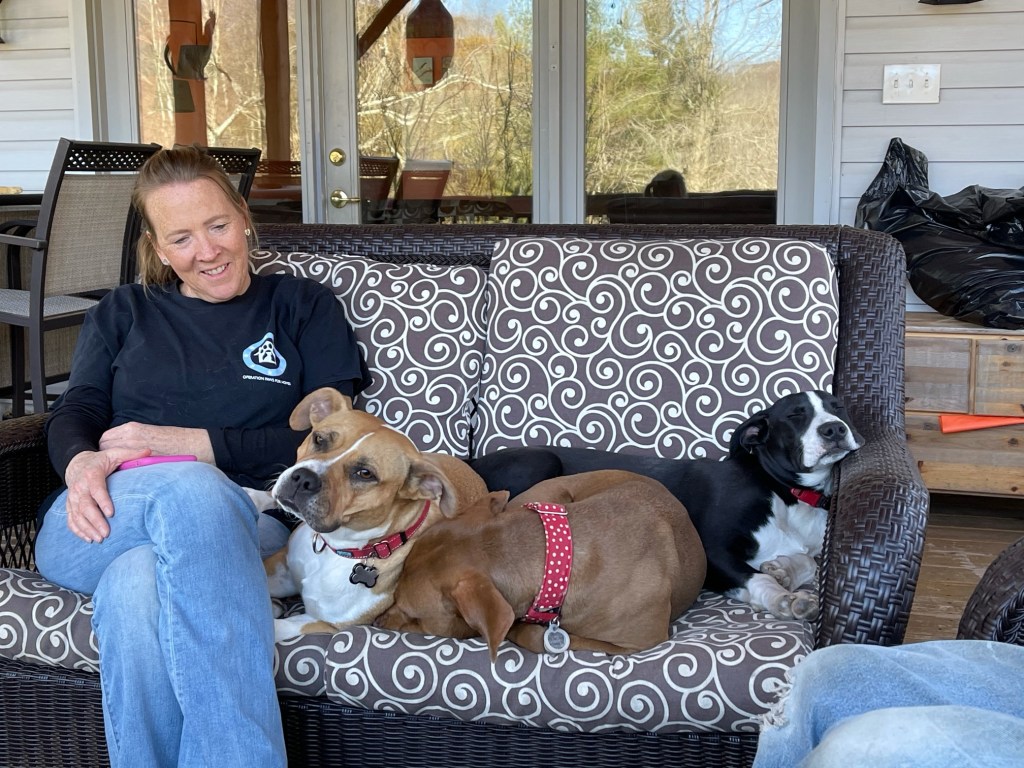
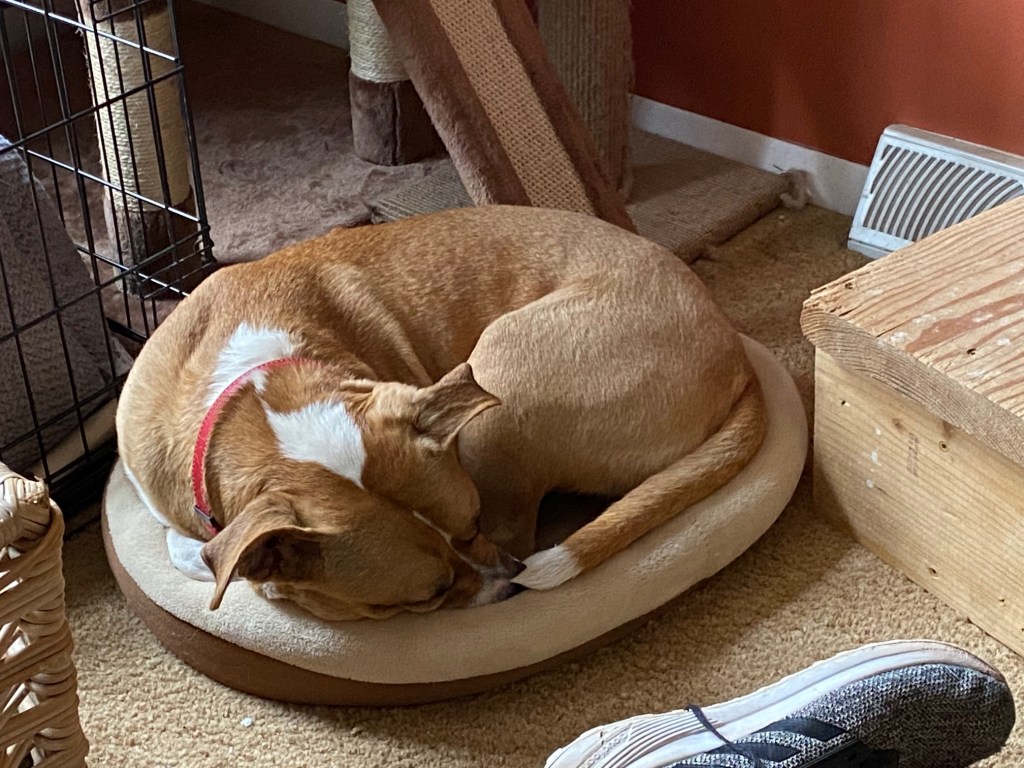

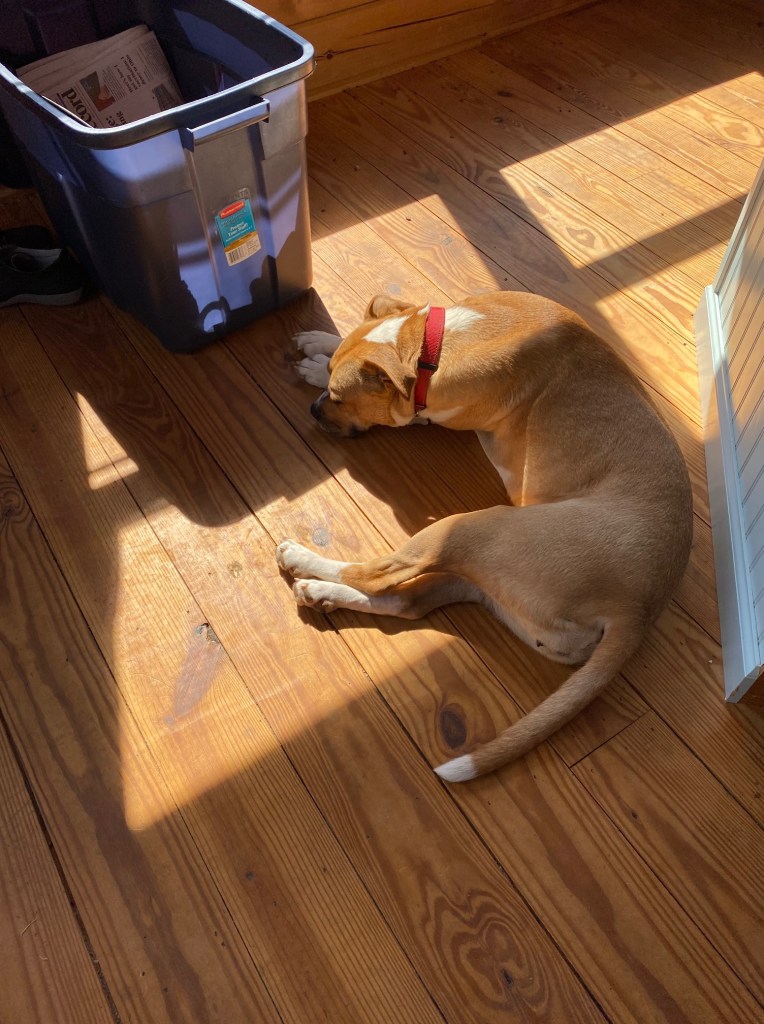
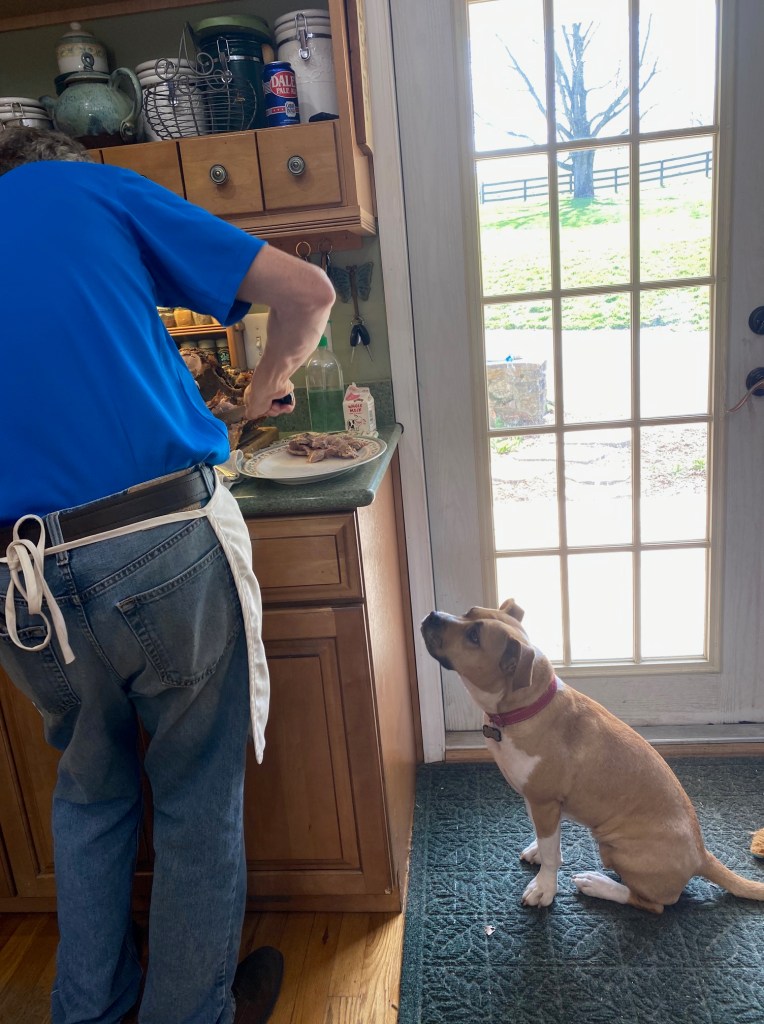
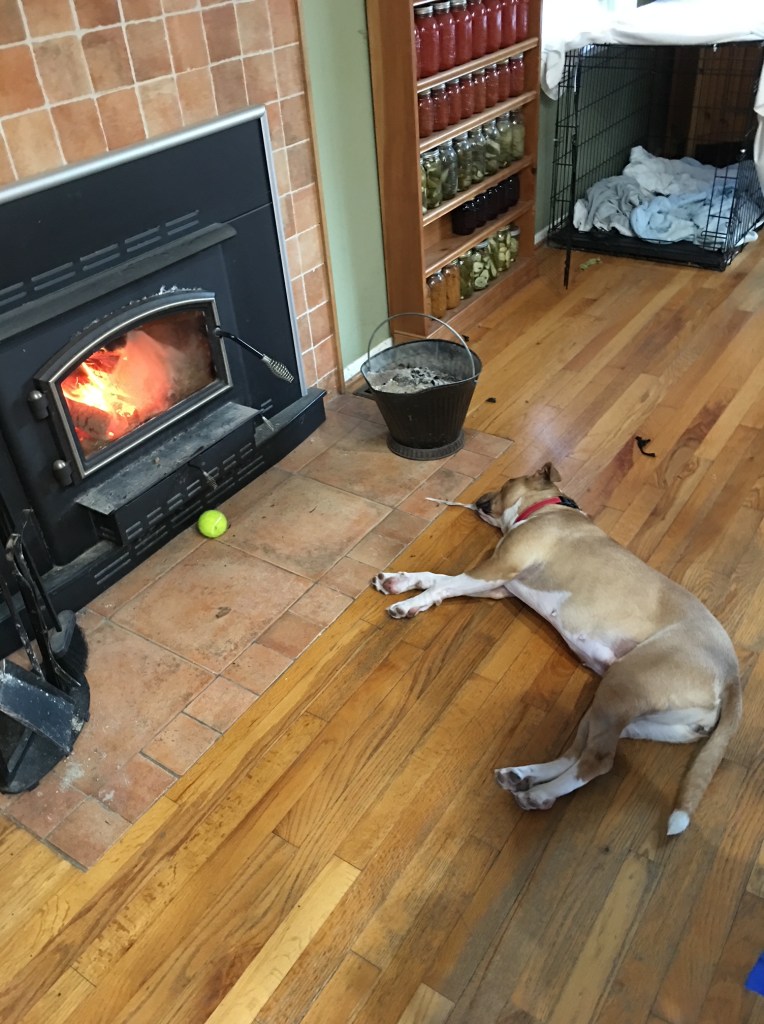

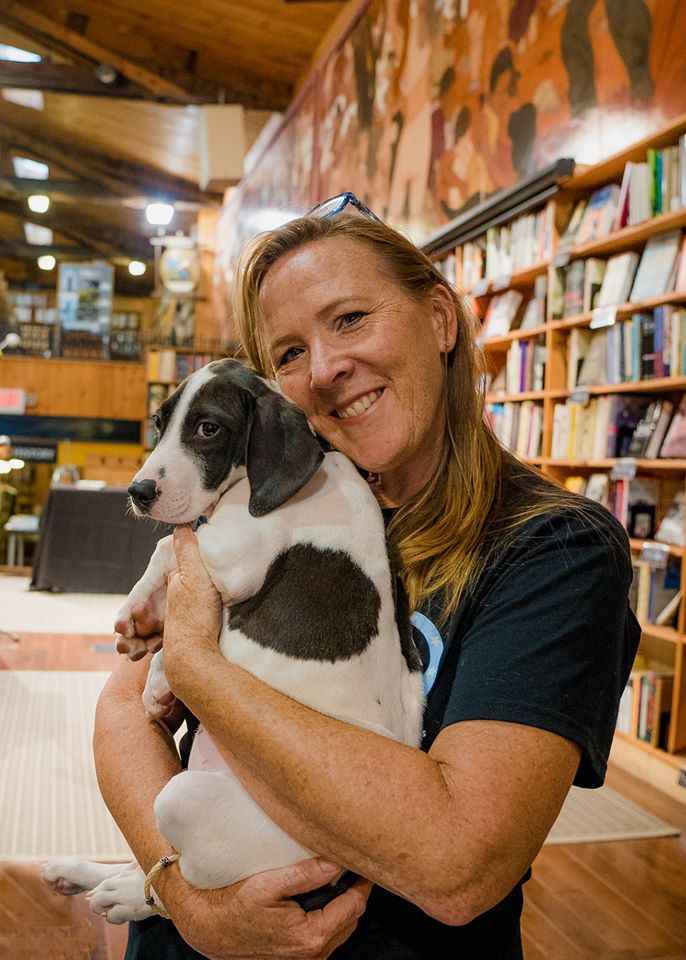
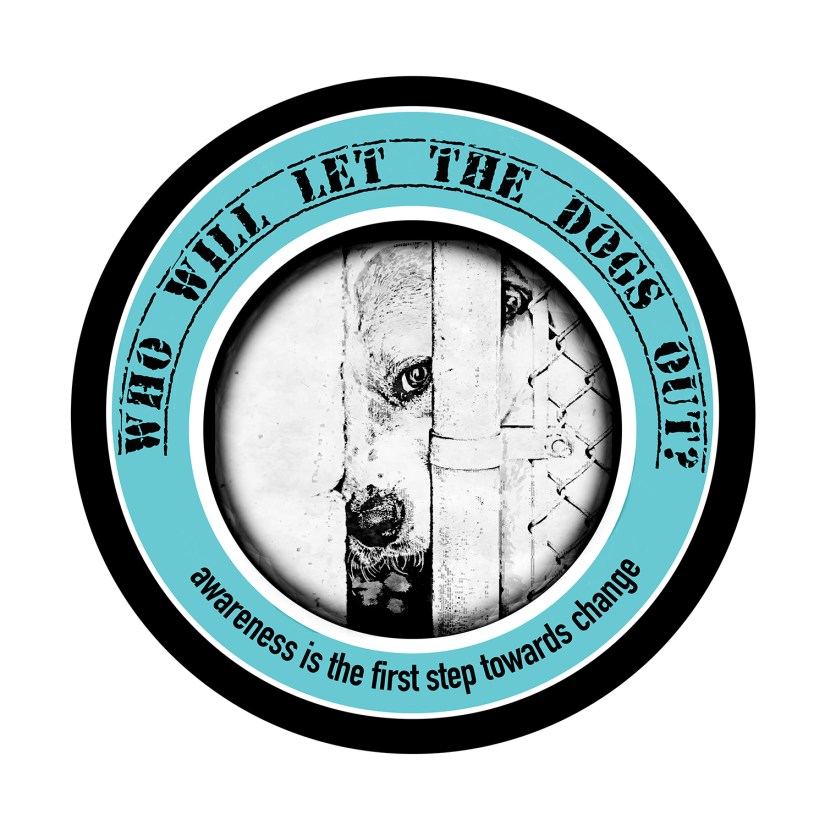
You are so right, Cara. There is no shelter shortage of dogs in the South. I live in NC, and you can visit just about any shelter in the state, and they are more than full. The “pit-bull” types are the most common “breeds” found in the shelters, and next are the hounds. Both of these type dogs are allowed to breed indiscriminately (or bred by “backyard breeders” thinking they are going to make a few bucks).
Now that hunting season is over, just about every rural shelter has more than its share of hounds that have been “lost” (in most cases abandoned or dumped) by so-called hunters. Many of these loyal, sweet-natured dogs have lived in a dog lot (a pen with little or no shelter or on a chain) all year except when they are in training or go hunting. If they don’t hunt well or have some age on them, many are just left in the woods or on the side of the road to fend for themselves. Some of these poor souls are found looking like concentration camp survivors. I am a hound fan and have rescued many of these amazing dogs.
In the more urban shelters, you can find just about any breed you are looking for. In the areas near military bases, pets are often left behind when soldiers deploy. I qualify that as “often” because most military families are very responsible pet owners, but those that aren’t will buy expensive, fancy dogs and just leave them behind when they move or deploy. Another heart-breaker is the scenario of seniors who can no longer take care of their loving pets and uncaring relatives drop off these scared, bewildered animals at the local shelter. Generally, these fancier breeds are quickly adopted or rescued by local dog rescues.
Fortunately, there are more and more rescues saving these “unwanted” dogs, and the number of dogs getting out of the shelters continues to increase, particularly with rescues from areas in the country that do have a shortage of adoptable animals. Unfortunately, no matter how many dogs (and cats) that get out of the shelters, the number going in also seems to increase. No, as you said, there is no shortage of dogs in southern shelters.
LikeLiked by 3 people
The pandemic did increase the demand side of the equation, and I don’t want to dismiss that, but as you experience, that still leaves too many dogs in our shelters. We have not ‘solved’ the problem, we have given a small reprieve, but I do worry about the aftermath of all those puppy adoptions and all that at-home-together time, plus the lack of socialization for so many newly adopted/purchased dogs and puppies.
LikeLiked by 1 person
Your video(s) brought tears to my eyes. Far too many “pitties” languish or are euthanized. It’s heartbreaking knowing there are so many of them who would make the best companion to someone. Keep fighting alongside Amber. You’re both angels on earth helping these dogs, one dog at a time and by telling the real story related to shelters and rescues.
LikeLiked by 1 person
Thanks – slowly, slowly we will change hearts and minds. I just wish it could happen faster for the good dogs still waiting.
LikeLiked by 2 people
Okay, I’m going to offer a contrarian view, even though I deeply respect you, Cara, and find you to be even-handed on pretty much all the issues you write about. I think the people who find dogs as strays or get them from friends and neighbors are keeping pets out of shelters, so that’s all to the good. I do not resent people who get dogs from breeders, IF they do their homework and adopt from a breeder who is careful about their dogs and their dogs’ health and who the puppies go to. People want dogs for all sorts of reasons, and are attracted to certain traits or personalities. If they care for their dogs, and are mindful of what their dog needs, and try like anything to keep their dog, and their dog doesn’t end up in the shelter, then I’m good with it. I’m more irate with people who neglect their pets, or don’t plan for their pets’ future if something happens to them, or abandon their animals.
Some pets are just hard to adopt out. We have several in my shelter now. Two are a brother and sister pair, maybe a husky-border collie cross, very handsome, quite large, and pretty much unsocialized. The boy is very barrier reactive and loses his mind when he sees another dog. The girl is skittish and has bitten one of the kennel workers. Unless we get very lucky, one or both of them will be around for awhile. We have another pup, a high-energy pittie who does not like men.
And Mia, oh Mia, a very special case. You’ve come to the conclusion that she shouldn’t live with another dog. Tons of energy and smart, which means the owner has to be at the top of their game to keep her out of trouble. I think there are people like that, but they usually have at least one dog already. I think her people are out there, but it may take awhile to find them.
I admire tremendously what you do, Cara. But I also worry that if people adopt, and it’s not a good fit, if they return the dog, then there’s a good chance they will not adopt again. It’s also HARD to find the right dog in the shelter. A friend, who has been working on her husband for 7 years to get a dog, and has two children with some special needs, has been looking for a dog for several months, and has been rejected by several rescues. That’s also discouraging.
LikeLiked by 1 person
I agree with you on all of these excellent points. I didn’t mean to come across as saying that no one should ever buy a dog. Good breeders do exist, I have a friend who is one of them. They carefully and selectively breed, raise the puppies well, and ensure that they get good homes.
My point is simply that if just a small portion of the people who buy dogs were to instead adopt, we could turn this tide. We could also put a lot of puppy mills out of business. Consumer demand and consumer behavior have more power to change the situation for shelter dogs than anything else we could do.
Almost anything that keeps a dog out of a shelter is always a good alternative. I consider all the dogs rehomed instead of taken to shelters as lucky ones and a win for the dog and our shelter struggles.
I also do recognize that there are individual dogs (not breeds) that can be difficult to adopt out and sometimes a shelter has to make a responsible decision after considering quality of life and potential future harm, putting the adopting public first. Once in a while, a rescue or a remarkable person can step in and pull out a miracle, but I would never want to run a shelter and be placed in the position of gambling on those chances.
I do think, though, that a lot of good dogs get passed right by because of appearance – and I call ‘pitbull’ not a breed but a label – they are often written off before they’ve even been met simply because of an arbitrary label based on a guess.
So, see? Your points aren’t contrary to my beliefs at all. Thanks for helping me clarify!
LikeLiked by 1 person
There isn’t a shortage of shelter dogs at all, sadly. Sometimes shelters have puppies and sometimes they don’t, but if you want an adult dog, there are always some at a shelter who need a home. The problem is that sometimes people want a specific breed, and that breed may or may not be available at a shelter at any given time. And I do agree with the comment above that some rescues make it almost impossible to adopt a dog, which is a shame. But there are also good rescue groups out there and its up to the would-be adopter to do his or her homework and find one!
LikeLiked by 1 person